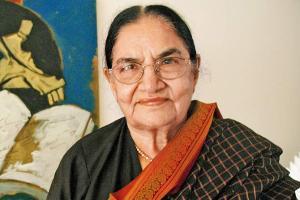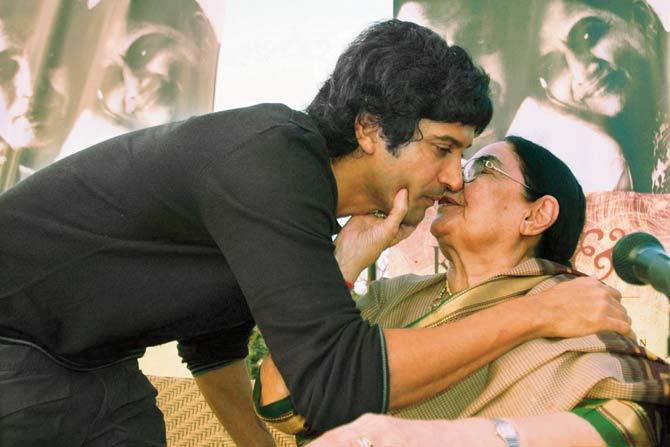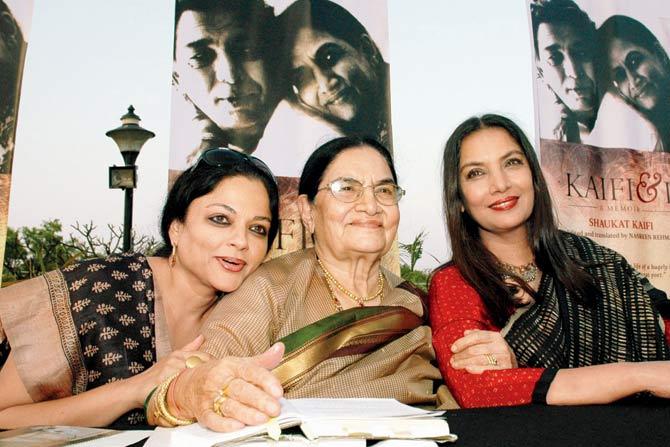One of Indian theatre and film's finest writers Javed Siddiqui, whose association with the Shabana Azmi goes back 50 years, traces Shaukat Kaifi's journey from an aristocratic family to a commune and then to the stage.

Shaukat Kaifi was the front of the Indian People's Theatre Association (IPTA) and acted in Africa Jawan Pareshan and Tanhai
I saw Shaukat aapa on stage for the first time in 1963 in the play Africa Jawan Pareshan (Africa, Young and Awake), written by Zul Vellani and starring AK Hangal. Produced by the Indian People's Theatre Association (IPTA), it was a story of bonded labour in Africa and the struggle for independence. This was my introduction to experimental theatre. I recall being so mesmerised by her performance, that I decided to join IPTA. I would go on to watch her perform a number of plays at Prithvi Theatre.
Shaukat aapa hailed from an illustrious, well-educated, affluent family in Hyderabad.
When she was 17, she saw Kaifi Azmi at a mushaira organised by the Progressive Writers Association. He was a handsome man; tall, dark and attractive. It was love at first sight. The relationship blossomed. As luck would have it, aapa's family had decided to get her married to someone else. A bombshell fell when she announced her decision to marry Kaifi sahab. But her father was a man ahead of his time. He said, "If you are in love with this man, why don't you go to Bombay and have a look at how he leads his life because he is a Marxist. If you are still intent on marrying him, I'll arrange for it." And so, the two of them, without informing the family, travelled to Bombay.
In those days, the Marxists lived in a commune in Andheri. It was a small bungalow, where each member was allotted a cot and table. Kaifi sahab was paid Rs 100 a month because he was a full-time communist party member. He would make the rounds of the trade unions in Parel and Lalbaug since he was leading the movement. After their Bombay visit, Shaukat aapa's father asked her once again if she wanted to marry a man whose future prospects seemed uncertain. The answer was an emphatic yes. The nikah was attended by progressive writers of the time, Josh Malihabadi, Sajjad Zaheer and Ismat Chugtai.
Even back then, running a house with Rs 100 wasn't easy. Shaukat aapa joined Prithvi Theatre to become part of a troupe of 100 artistes and technicians and performed with Prithviraj Kapoor, Zohra Sehgal, Sajjan and other greats. When Kapoor decided to shut down Prithvi due to financial problems, she began performing for IPTA.

Shaukat Azmi with Farhan Akhtar
Her play, Tanhai, was a masterpiece, written by Sagar Sarhadi, where she played an out-of-work retired actress. For me, her big film was Garam Hava, the 1974 Urdu drama directed by MS Sathyu, with Balraj Sahni in the lead. It was written by Kaifi Azmi and Shama Zaidi and was based on an unpublished short story by Ismat Chughtai. It explored the restlessness and emotional displacement in Muslim families who decided to stay on this side of the border after Partition. The other film, is, of course, Umrao Jaan, where she played Khanum Jaan, a strong, autonomous woman, who runs the best show of courtesans in Lucknow.
While she was an actor par excellence, Shaukat aapa was also very fussy. She'd insist on getting the minute details of the character right. Just before a show or shoot, she'd lock herself up in a room for two to three days. Nobody was allowed to call her. At times, she'd skip meals. But once she got on stage, you could see the transformation. What a talent powerhouse!
At the time, aapa ran a small club called Gariban Ka Club, where writers would socialise and engage in intellectual conversation. She was very warm and large-hearted. Most actors were poor with not enough to eat, and Shaukat aapa's home was an open house. Permanent hangers-on were Sanjeev Kumar, Yunus Parvez, Mac Mohan and Satyen Kappu. They'd say, "Aapa, kuch khila dijiye", and she would arrange for it. We might have called her aapa, but she was a mother to us.
When it came to her relationship with Kaifi sahab, they were equals. According to me, her love for him later evolved into worship. He was next to God for her. In the '90s, when he suffered a stroke, she became his arm and limb. She pulled all stops to get him cured; took him to Moscow, then Dharamsala, because somebody told her that the Dalai Lama's ved was good. Kaifi sahab lived for 30 years after that, and it's thanks to aapa and her selflessness.

Shabana and Tanvi Azmi at the launch of her book, Kaifi and I, in 2010
She was a big support to Shabana when she wanted to act in films. She said, if she wants to be an actor, she should. In those days, Shabana also wanted to go to an English medium school, and that was costly. Aapa worked day and night to ensure her children got the best. In fact, she was the one to encourage my daughter, Lubna Salim, to continue with theatre. This sort of encouragement for a newcomer is important. It can make or break an artiste.
After Kaifi sahab passed away, she called me to discuss her plan to write a book dedicated to him.
"I will tell you and you write it for me," she said. I gently refused because I knew it would be difficult for me to do justice to her emotions. I insisted that she write it herself, and if she encountered a problem, I would fine-tune it. She wrote a chapter and read it out. It was good and I goaded her to write the whole book herself. Yaad Ki Rehguzar, her 2004 memoir, is an account of her childhood, romance with Kaifi Azmi, life in the commune and the shift to Juhu's Janki Kutir. It was turned into a play in 2010—Kaifi and I is still running.
Shabana told me yesterday, "My mother lived a full life".
She did.
Catch up on all the latest entertainment news and gossip here. Also download the new mid-day Android and iOS apps to get latest updates
 Subscribe today by clicking the link and stay updated with the latest news!" Click here!
Subscribe today by clicking the link and stay updated with the latest news!" Click here!









